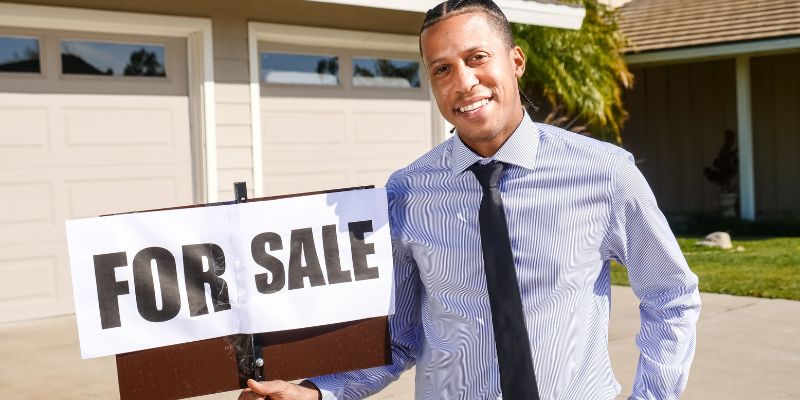
How To Sell A Home Without A Realtor
Asma
Selling a home on your own saves you a lot of money that could go into a realtor's pocket, but it also requires time and effort. In this guide, we'll walk you through the key steps to sell your home without a realtor, from preparing your property for sale to closing the deal. Whether you're looking to avoid agent commissions or want more control over the process, this article will help you navigate each stage of the home-selling journey.

What Is “For Sale By Owner” (FSBO)?
FSBO, or "For Sale By Owner," refers to selling a home without a real estate agent. The main benefit is saving money on agent commissions. These commissions can go as high as 8-10% of the sale price. Many homeowners choose FSBO to have more control over the sale process and avoid paying agent fees. FSBO can also be a good option if you have experience in real estate or want to handle the sale yourself.
How Selling Without a Realtor Differs From Using An Agent
In a sale without a realtor, you take on all the responsibilities of the sale. This includes marketing your home, showing it to potential buyers, negotiating the price, handling legal paperwork, etc. In most cases, you may have to do more research than having an agent to ensure you're following the laws of the land and best practices.
The difference is that an agent usually takes care of such tasks, providing expertise and guidance. Selling without an agent will help you save money, but it also means you must be ready for all aspects of the sale. Depending on your experience, this can be both challenging and rewarding.
How To Prepare Your Home For Sale
Cleaning And Staging Your Home
Before you put your home on the market, it's crucial to clean stuff up and declutter all the junk. The first impression is the last. Remove unnecessary items and deep clean all rooms, including floors, windows, and bathrooms. Simple staging techniques like arranging furniture to highlight space and using neutral colours can help potential buyers envision themselves in your home. You can even add a few plants or fresh flowers to brighten the rooms.
Pricing Your Home Correctly
Research comparable homes in your area to set a competitive price. Look at homes similar in size, condition, and location. Consider what homes have sold for recently to understand the market. Pricing too high can discourage buyers, and pricing too low may result in lost value. Adjust your home value realistically and according to current market conditions.
Making Necessary Repairs And Upgrades
Minor repairs that cost little and make the home look neat (simultaneously!) can significantly affect how buyers view it. For instance, fix leaky faucets, repair damaged walls, or update old fixtures. You don't have to renovate significantly; minor upgrades like fresh paint or updated lighting can make your home look better. Focus on improvements that give you the most value for your money and will attract buyers quickly.
How To Market Your Home Without A Realtor
Listing Your Home Online
Listing your home on famous real estate "buying-and-selling" websites like Zillow, Realtor.com, or FSBO-specific sites is essential. High-quality photos are key—take pictures that showcase the best features of each room, including the exterior and backyard. Include detailed descriptions of your home, focusing on its unique features, upgrades, and location. Make sure to list the price, number of total rooms (like bedrooms and bathrooms), square footage, and all the essential details.
Hosting Open Houses And Private Showings
Hosting an open house can draw in multiple potential buyers. Advertise the open house in advance through online platforms, social media, and neighbourhood groups. Ensure your home is clean and well-presented before the event. Schedule appointments with serious buyers for private viewings and give them all the information they need. While showing the property, engage with buyers by answering questions and pointing out key features. Let buyers take their time while you listen to them. Also, stay open for guidance.
Using Traditional Marketing Methods
Remember traditional marketing methods. Yard signs placed outside your home can catch the eye of passersby, while flyers distributed in the neighbourhood or at local businesses can help spread the word. Local newspapers or community boards may also effectively reach a local audience. Networking with friends, family, and neighbours can also help you get the word out, as they may know someone interested in buying.

Responding To Offers And Negotiation Tips
When you get an offer on your home, it's essential to think about it carefully. Here are some things to consider:
Price Negotiation: The price is usually the main topic. Check recent home sales in your area to determine the fair market value. You should explain why you set your price and be ready to adjust.
Contingencies: Contingencies need to happen before the deal is complete. These can include financing, inspections, and appraisals. If you try negotiating these terms or removing some of them,
Closing Terms: The closing date and possession date can also be negotiated. When discussing these details, consider your schedule and the buyer's needs.
Conclusion: Closing The Sale
It's easier to sell a house with a realtor, but you can do it independently if you keep track of everything. You'll be dealing with a title company and escrow agent to take care of all the paperwork, money, and transfer of ownership. Your important steps are checking the closing disclosure, signing necessary papers, and handling the cash correctly. You don't want to get robbed by a "scammy trickster," as these incidents are common. We can't Stress the importance of staying organized and sharp during these deals.




